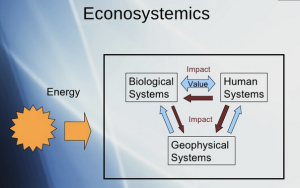What is Econosystemics? Revisited.
Every time someone asks me what econosystemics is, I find I tell it a little differently. I guess that’s the honest mark of an evolving paradigm; it gets a little clearer the more you think about it.
Econosystemics reframes economics to focus on the creation and accumulation of value, not only in human society, but also in this gloriously complex biosphere we are part of. We’re all in this together, and it isn’t a zero-sum game. There is hope for us all.
That is a very different approach from the economics that is taught in our universities and business schools, in which the emphasis is on the pricing and allocation and of scarce resources. Not only in the textbooks, but also in popular discourse, the focus is on a consumption-driven, human-only economy. Corporations, in this paradigm, compete to satisfy the pre-existing consumption demands of households. Households return investment and labor to the corporations, and aside from resource scarcity and waste, that’s the closed loop. Economic growth, deemed essential to a healthy economy, is about continually increasing production and consumption. Running faster and faster in the rat-race; the devil take the hindmost.
But life isn’t that neat and simple, nor so bleak.. Life on Earth is an open thermodynamic system, receiving energy from the sun and converting it, somewhat chaotically, into more life — or into things which have value for life. Life on Earth is a complex, dynamic system that keeps on evolving. Human economic activity is not fundamentally different from all the rest of life, we just take it to a different level. We channel energy from various sources through our economic infrastructure to create value: the things that we need or want. We consume much of that value, but a substantial fraction gets reinvested into our ever-evolving infrastructure. In that regard, it is a virtuous cycle of value accumulation.
We are, however, destroying value within the larger ecosystem. Humans are now a dominant force of change, responsible for environmental disruption and rapid biodiversity loss. Econosystemics, therefore, looks at our value creation in context: what value is, and how it is created and destroyed in a complex dynamic system that includes not only what we call “the economy”, but also our quality of life and all of what we call our “environment”. Econosystemics considers not just a flow of value from “nature” to human society, but examines the flows of value in all directions within the whole ecosystem web.
Econosystemics doesn’t ignore consumption, but it notices that new value creation precedes demand. For a company like Apple, for example, the marketing mantra isn’t “Find a need and fill it,” but “Create a new need.” In econosystemics, what matters is not economic growth but economic development, which can be defined as the net accumulation of value within our entire biosphere — made thermodynamically possible by a flow of energy. If economics is the “dismal science” focused on scarcity, econosystemics is a “hopeful science” that offers the promise of human “progress” without deprivation of the many for the sake of the few, and without the destruction of our vital biosphere.
It is very important for modern corporations to internalize this viewpoint as part of their culture. The most successful corporations, in the long run, are not those that focus on building today’s products more cheaply, but those that are inventing new technologies and new ways to create and accumulate value. The most successful companies, in the long run, are not those that exploit their employees and communities, but those that invest in their employees, communities, and the environment. You see this in the trend towards corporate co-opetition, in the success of companies like Google and Apple, and in the movement towards multi-stakeholder, environmental and social responsibility.
Where this is heading is towards a responsible society of corporations, in which an informal and formal social contract emerges that enforces norms and disciplines corporations that are blatantly destroying value, whether by environmental destruction or by promoting and profiting on war and social conflicts. This isn’t just about morality; it’s about business, too. Companies that can refocus their activities away from debt-fueled, unsustainable consumption and towards an ongoing accumulation of value within the econosystem will be the most successful companies of the next decades.


Recent Comments